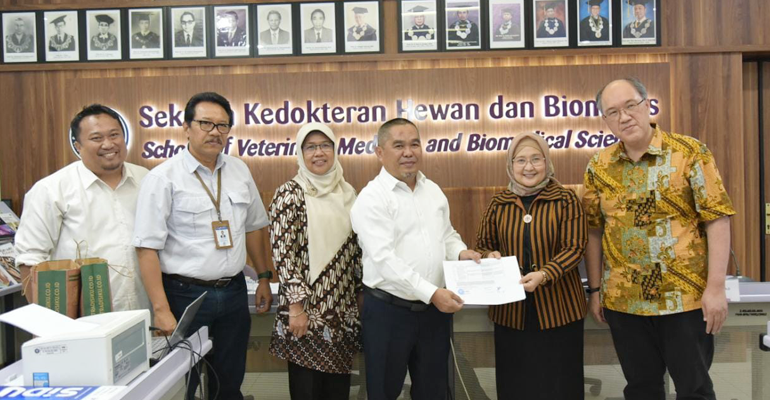IPB University Welcomes Field Assessment Visit for Bachelor of Biomedical Science Program by LAM-PTKes

The School of Veterinary Medicine and Biomedical Sciences (SKHB) at IPB University received a field assessment visit from the Independent Accreditation Institution for Health Higher Education (LAM-PTKes) at the Dramaga Campus (15-16/8). This activity was carried out with the aim of evaluating and verifying accreditation documents for the Bachelor of Biomedical Science Program. The field assessment team from LAM-PTKes consisted of two assessors, including Dr dr Paramasari Dirgahayu and Dr dr Soegianto Ali.
In his opening remarks, the Vice Rector of IPB University for the Education and Student Affairs, Prof drh Deni Noviana, explained the background of the establishment of the Biomedical Science Program. About 60 percent of the research conducted at SKHB IPB University is related to biomedical sciences. In addition, the development of biomedical knowledge is also present in the Faculty of Mathematics and Natural Sciences (FMIPA), which supports the establishment of this program.
The Faculty of Veterinary Medicine (FKH) has now transformed into SKHB. We started by facilitating it from its previous foundation and developed its biomedical science component. Our hope is that it can proceed smoothly and we fully support the establishment of this program for the future development of biomedical research,” he concluded.
The Dean of SKHB at IPB University, Dr Amrozi, stated that the mandate for establishing SKHB is to provide innovative and competency-based education to produce graduates who are well-capable of facing technological advancements. In this regard, the excellence of the Biomedical Science Program lies in the development of biomedicine through a one health approach.
“The emphasis on the one health concept is present in the development of animal models, the preparation of biopharmaceuticals from tropical natural resources, as well as biological materials,” he stated.
Dr Paramasari Dirgahayu, an assessor from LAM-PTKes, mentioned that the excellence of a program should be part of the graduate profile and program vision. Furthermore, the content of excellence that is incorporated into specific courses can also be integrated as a subject of study in other courses, allowing the weight of credit hours (SKS) for excellence to be assessed more comprehensively.
“Excellence needs to be more focused and add value to graduates in the job market. For that matter, a larger allocation of SKS is necessary with more specific subject matter. This ensures the achievement of outstanding competencies in the Freedom of Learning – Independence Campus (MBKM) activities,” he explained. (dr/Rz) (IAAS/ZRT)



